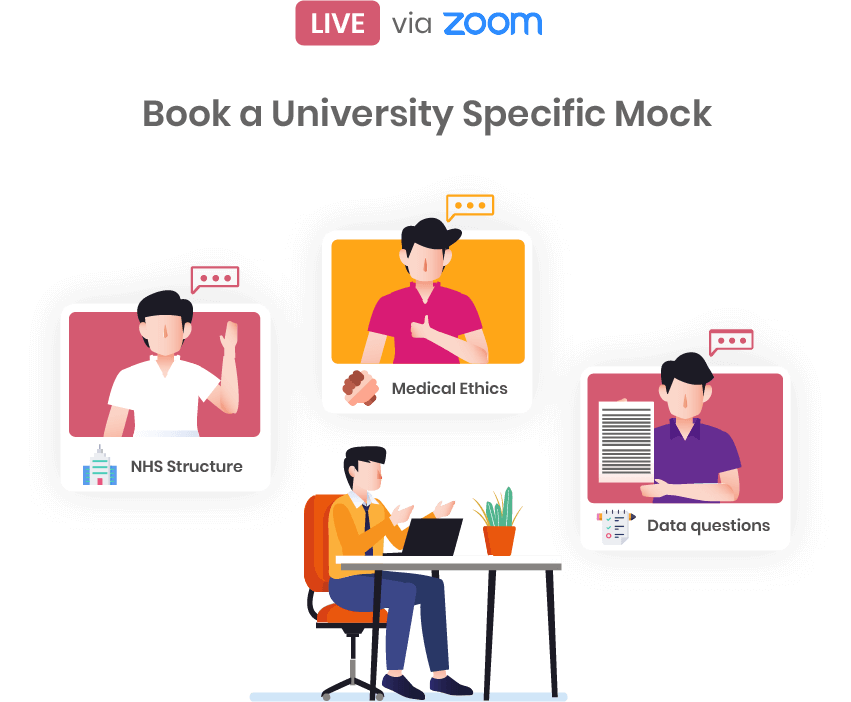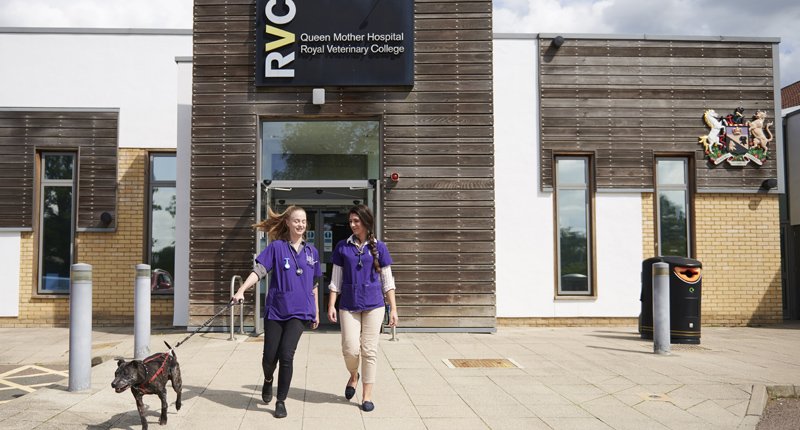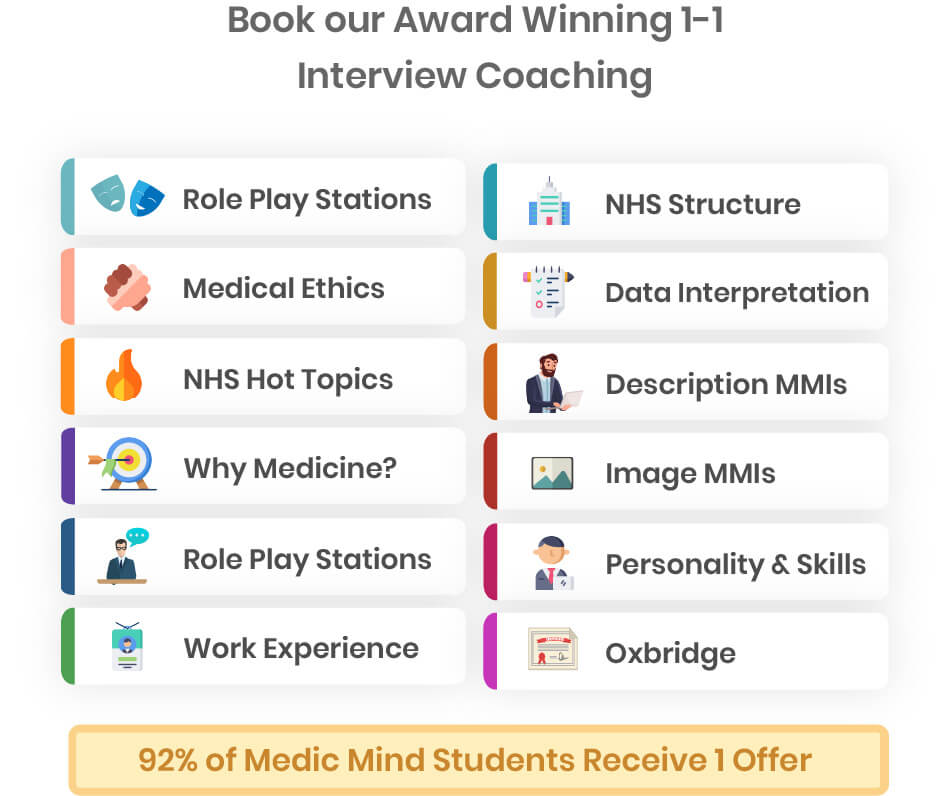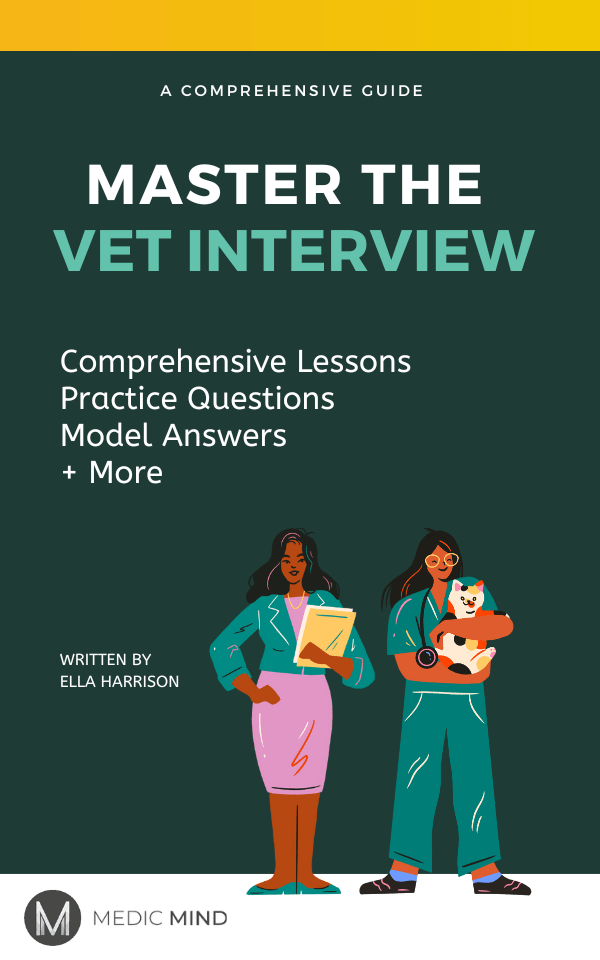Loading...


Royal Veterinary College Interview Questions
This article was updated in December 2023 with the latest information, and we will continue to regularly update it!
The Royal Veterinary College (RVC) acceptance rate is currently around 38%, although the 2024 entry statistics have not yet been released.
For more information about the Royal Veterinary College Veterinary Interviews, click here: RVC Interviews
For 2022/23 entry, some of the RVC MMIs were held remotely. The RVC interviews normally have an 8 station MMI, with each station lasting 6 minutes, and a short group discussion. In this guide, we provide an expert insight into past RVC MMI stations, the RVC interview day and tips for converting your RVC interview into an offer!

2023/2024 entry RVC MMI in a Nutshell
What is the RVC Veterinary Interview style?
For 2023/24 entry these may take place online, although they are hoped to be in-person. The RVC usually has an 8 station MMI, with each station lasting 6 minutes, and a short group discussion. The exact format for 2023/24 entry hasn’t yet been released and successful applicants will receive more information in their interview invite.
When are the RVC Veterinary Interviews held?
RVC interviews are held in late November and December in the UK, in January in the United Stated and in early January in Asia.
Meet Our Royal Tutors!
Book a session with one of our expert Royal tutors to boost your chances of getting into medical school! Call us on +44 (0) 203 305 9593 for a free consultation.
What are the common topics covered at the RVC Veterinary Interview?
Common topics discussed at the RVC Veterinary Interview are:
- Role play
- Clear communication
- Work Experience
- Prioritisation
At Medic Mind we’ve helped many students secure offers from RVC and other Vet Med schools. If you’re applying to RVC, we can do a high quality 1-1 mock with you with a RVC tutor and realistic stations uniquely for RVC.
Book a University Specific Mock
Meet our Tutors from RVC

List of Recent RVC MMI Stations
| Theme | RVC Example Questions |
| Group Activity | Can you order a list of desirable qualities to be a vet? |
| Work Experience | Describe what happened in some surgery that you have seen |
| Communication & Role-Play | How might you give advice to a stubborn student applying to veterinary medicine? How might you tell someone that they didn’t do a very good job? How would you deal with an awkward client? |
| Personality & Skills | Can you give clear instructions to solve a problem? |
| Veterinary Anatomy | What is this organ? What does the organ do? |
| Veterinary Ethics | Can you prioritise a list of patients in a busy practice? |
An RVC Medical Student’s Perspective
Name 3 Reasons why you picked RVC
- The RVC community – the RVC is full of students that are welcoming and inclusive of everybody. It is an incredible community to be a part of because everybody is so kind and friendly. RVC students are incredibly proud to be RVC students and it makes for a very supportive and close-knit network of students.
- Beautiful campuses in both Camden and Hertfordshire – I personally love that you get a mix of both city and countryside with the RVC. The first two years are spent at the Camden campus and the last three years are spent at the Hawkshead campus in Hertfordshire which are both absolutely incredible campuses with amazing facilities.
- The amount of group work and practical teaching – I personally find working in a group really beneficial to my learning and I love practicals so having both of these every single week at the RVC was a massive selling point for me.
What makes RVC unique to other veterinary schools?
What really stood out to me about the RVC when I was applying for vet med was how passionate RVC students are about the university. Now as an RVC student myself I completely understand this love for the university. It is an incredible university to be a student at because all of the students are so friendly. Some people think that being at a university of just vet students would be boring but this couldn’t be further from the truth. We are all linked by our shared goal of being vets and this creates an incredible community to be a part of. Something else that makes the RVC really stand out is that it is accredited in the UK, the EU and the USA and Canada. This gives students the option to work in these countries much more easily when they qualify which will open endless opportunities to travel and gain experience abroad.
Insider Guide: RVC Veterinary Medicine Interview Day
How did the RVC Veterinary Medicine Interview day work?
After arriving at the main reception on the RVC Camden campus, you register at the desk. If you’re arriving early, which is recommended, you can sit in the cafe and enjoy a really good hot chocolate with whipped cream and marshmallows. Once invited into the main lecture theatre, you will be given a talk on the RVC and how the day will work. There will be lots of other students who also have interviews on the day, so you will be split into three groups. Each group rotates between a tour, a group activity and then the MMI interview.
What did you have to bring for the RVC Veterinary Medicine Interview?
Students need to bring previous qualifications and ID to be scanned in. It never hurts to bring a pen too! There were a range of different outfit choices, varying from smart-casual to smart. I wore a smart black pair of jeans with a blue blouse and a cream cardigan. The most important thing is to be comfortable.
What was the setting for the RVC Veterinary Medicine Interview?
The MMI took place in one room and had 8 stations with screens in between so that you couldn’t see other students and stations while being interviewed. The stations were arranged in lines and you worked up your line as you moved to new stations.
The group discussion took place in a different room, in a group of approximately 5 other students. There are two interviewers that sit around the table with you and listen to your conversation.
How did you receive information for each RVC MMI station?
An instruction sheet provides an overview of each station and you are given time to read this before each station starts. The instruction sheet is brief and very simple to understand. The interviewer asks if you are happy to start the interview and then you have a chat about what is on the sheet. You can ask any questions if you are stuck.
What were the RVC MMI examiners like?
The RVC examiners are so friendly! They make the interview feel more like a chat, rather than a quiz about what you do and don’t know. The examiners care more about how you think than what you say. If you say something that you then later decide that wasn’t the best answer, they quite like to see you go back over the question and think it through. Talking through your reasoning is the best way to engage with the examiners.
Did the RVC MMI interviewers ask a lot of follow up questions?
The RVC interviewers make each station flow as a conversation, rather than a set list of questions. The examiners allow you to explain each of your points, but will pull you back on track if you start to wonder too far. They are more interested in letting you speak, rather than quizzing you.
How long is the actual RVC Interview?
The interview was scheduled as 4 hours, but took approximately 45 minutes for the MMI and about 10 minutes for the group interview. The whole day goes by really quickly, so enjoy it!

What do you advise for the day? (Accommodation, Travelling)
Arrive early and prepare for rush hour on the tubes. Tubes will always be busier than you think! Staying overnight might be a good idea if you live a little while away. Enjoy London while you are there and make the most of the city!
How long did it take you to hear back after your interview?
I personally heard back within a week. Interview results are sent out in batches, with most being delivered in early to mid-February. Please don’t feel panicked if you don’t hear back immediately.

Top Tips for RVC MMI Interview
1) Take this as an opportunity to start thinking like a vet! The interviewers are more interested in how you think, rather than what you know, so practise lots of different questions.
2) Talking your reasoning through with the examiner is one way to expand on what you are discussing. If you can explain why you think what you think, you will show the examiner that you are reflective. This is a really important skill to become a vet.
3) Do a small bit of research into what each organ does and the anatomy around it. You won’t need anything too complex, but I was surprised when I was asked to talk about the anatomy of the liver.
4) RVC tend to like to have an anatomy station. This is where they will show you a picture of something and the point of the station is for you to figure out what that picture is. Don’t feel stressed about this station! They are assessing your problem solving skills and want to hear about your thought process behind how you get to your answers. It doesn’t matter if your answers aren’t correct as long as you are explaining how you have got to your answer.
5) Communication is really important in the RVC interview, particularly during a role play station or a practical station where you have to explain to your interviewer how to do something. Remember that your non-verbal communication is just as important as your verbal communication. Smile, make eye contact, use hand gestures, lean forward and all of the other things that you would do whilst having a conversation with someone to show that you are interested!
6) During the group interview, remember that you are being assessed the whole time you are in the room! Don’t finish the task and think that the interview is over because you are still being assessed. Talk to your peers and say well done for completing the task, be encouraging and positive about how your group performed.
RVC Application
The RVC say that..
Prior to application, all applicants must have completed the following:
- A total of 70 hours (e.g. 10 full days) of work experience (paid or voluntary) in one or more veterinary practices
- A total of 70 hours in one or more non-clinical working environments with live animals (excl. the home environment/family business/pet ownership)
The above 140 hours must be obtained within the 18-month period directly preceding the application deadline. Earlier experience is welcome but will not count towards the 140 hour requirement.
We encourage you to think creatively about these environments and are interested to hear about any experiences that have helped to give you a sense of the veterinary role in the wider world. Examples of suitable non-clinical environments might include, but are not limited to: kennels, cattery, animal shelter, rural or city farm, stables, pet shop, lambing, intensive livestock, abattoir, animal research laboratory, wildlife park, zoo, etc. You do not have to have gained experience in all these areas.
NB: references will need to be available ahead of interview; we strongly advise obtaining as you go.
To find out more about information about changes to the RVC Veterinary interviews, click here: RVC Interviews
Book a University Specific Mock

Frequently Asked Question
→What are the entry requirements for the Royal Veterinary College?
The entry requirements for the Royal Veterinary College vary depending on the programme. Generally, applicants must have excellent grades in science subjects such as Biology and Chemistry, as well as strong communication and interpersonal skills. Relevant work experience with animals is also desirable.
→What is the Royal Veterinary College interview process like?
The Royal Veterinary College interview process is designed to assess a candidate’s academic and personal suitability for the programme. The interview process typically includes a panel interview, which may include questions about the candidate’s academic background, work experience, and motivation for pursuing a career in veterinary medicine.
→What should I expect during the Royal Veterinary College interview process?
During the Royal Veterinary College interview process, candidates can expect to participate in a panel interview with faculty members and admissions staff. The interview may include questions about the candidate’s academic background, work experience, and motivation for pursuing a career in veterinary medicine. Candidates may also be asked to discuss ethical or animal welfare issues.
→What are the career prospects for graduates of the Royal Veterinary College?
Graduates of the Royal Veterinary College are highly sought after by employers in the veterinary profession. Many graduates go on to work as veterinarians in private practices, while others pursue careers in research or academia.
→What is the teaching and learning experience like at the Royal Veterinary College?
The teaching and learning experience at the Royal Veterinary College is designed to be challenging and engaging. Students are exposed to a range of learning methods, including lectures, practical sessions, and clinical placements. The university also emphasises the importance of hands-on experience, and students are given opportunities to work with animals in a variety of settings.
→Is it hard to get into RVC?
The Royal Veterinary College (RVC) is a highly competitive institution, and admission can be challenging. However, the difficulty of admission can vary depending on the program and the number of applications received. The entry requirements for the RVC are rigorous, and applicants are expected to have excellent grades in science subjects, relevant work experience, and strong communication and interpersonal skills. The interview process is also designed to assess a candidate’s academic and personal suitability for the program. While admission to the RVC can be challenging, it is important to remember that each application is assessed on an individual basis, and there are many factors that can contribute to a successful application.





Was this article helpful?
Still got a question? Leave a comment
Leave a comment
366 Comments
AnonymousMedic Mind Tutor
29 November 2021
Hello,
I applied for two courses at the RVC but haven’t heard back from them regarding either.
I’ve read that interviews are normally held end of November and December.
Should I email them for a follow-up or just wait it out?
-A